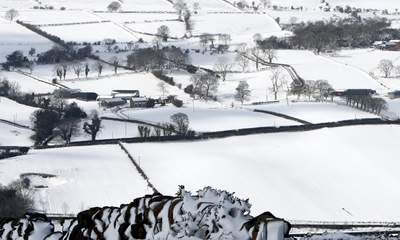Snow: Thousands Without Power Amid Warnings
Thousands of people in the west of Scotland are spending a fourth night without power after two electricity pylons were toppled by sheets of ice and snow.
Ice has packed onto power lines, causing them to buckle under the weight, and forecasters have warned the wintry weather is set to continue across large parts of the UK.
A Met Office warning stated: "Bitterly cold easterly winds will persist this week, bringing snow showers to north-east England and light snow flurries across other areas of England."
Scottish and Southern Energy (SSE) said 3,300 customers in Kintyre, Argyll, and on the Isle of Arran would remain cut off overnight.
This number is down from 5,000 earlier on Monday as around 400 engineers continue their efforts to restore supplies, it said.
The provider said it was the first time in the company's history that two of its metal pylons have come down. It said the last time a pylon was felled by severe weather was in 1987, in the north of Scotland.
The Caledonian MacBrayne ferry between the mainland and Arran was laden with engineering support to be deployed in the island.
Sky's Scotland Correspondent, James Matthews, said: "Lorries carried generators and fresh telegraph poles. There was also a small fleet of outdoor catering vans which had been drafted off duty at commercial public events to come and supply islanders running short of supplies."
Northern Ireland Electricity said it expected to reconnect power all its customers on Monday night after tens of thousands were cut off a few days ago.
Ice and snow warnings are in place for many areas of the UK as the freezing conditions continue to bring disruption to the roads.
The AA said its patrols have faced a "winter war zone" - attending more than 1,100 call-outs to people either stuck in snow, ice or flood water since Thursday, including more than 150 on Monday.
By 5pm, it said it had attended around 12,500 breakdowns nationwide, peaking at around 1,700 every hour. It said it expected to exceed 16,000 call-outs for the day, compared with around 10,500 on an average Monday.
Some patrols had to fight their way to customers through snowdrifts higher than their rescue vehicles and often had to move abandoned cars to get to stranded people.
Snowdrifts - up to 15ft deep in some places - and abandoned vehicles also prevented energy companies from reaching some areas to restore power.
The Department for Transport has warned motorists to take precautions and only set off from home if they have checked the latest travel conditions.
A spokesman said: "The unseasonal weather is affecting transport networks. Our staff and other transport operators are working tirelessly around the clock to keep roads open, and keep other services running."
The Met Office has issued a yellow warning for the public to be aware of snow showers that will continue to affects parts of central and eastern Scotland, north-east England and Northern Ireland overnight and into Tuesday morning.
There could be 1-2cm in places and up to 5cm on hills. Forecasters have also put out a yellow warning of ice, urging drivers to take extra care on the roads, with eastern parts of Northern Ireland at particular risk, especially where melted snow refreezes.
Farmers - yet to recover from the disastrously sodden summer of 2012 - have said the Arctic weather has come at the worst possible time.
Blizzard conditions are claiming the lives of newborn lambs, affecting spring crops and forcing families to work all hours to try to keep stranded stock alive, according to the National Union of Farmers (NFU).
And the severe weather and bitterly cold temperatures are set to continue across most parts of the country right up until the weekend, forecasters have said.
This could mean the first white Easter in five years, as the nation enters British summertime.
The Met Office - which has extended its level 3 cold weather alert until Friday - has said there is a 100% chance the unseasonal cold snap will continue to keep large parts of Britain frozen for the rest of the week.
It is a marked contrast to the warm spring weather the nation enjoyed this time last year.
On March 24, 2012, sun-seekers flocked to Brighton to bask in the sunshine and 18C (64.4F) heat. In comparison, the beach was deserted on Sunday with the temperature at just 2C (35.6F).
In northern England, many cross-Pennine routes remain blocked by drifting snow, including the Snake Pass and Woodhead Pass, between Manchester and South Yorkshire.
Sky News Weather Presenter Nazaneen Ghaffar said the heavy snow had subsided but added: "As we head towards this Easter weekend, it's going to remain unsettled, In fact, on Good Friday, there's the risk of more widespread snow."
Bookmaker Ladbrokes has cut the odds of snow at Easter to 4/5 after taking a flurry of bets in the past 48 hours.
Forecasters have predicted it could be the coldest March in 50 years. In 1962, average temperatures for the month were 2.8C (37F).

 Yahoo News
Yahoo News 

